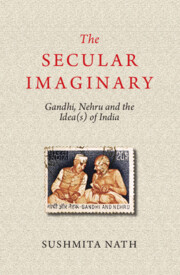Book contents
- Frontmatter
- Contents
- Preface
- Acknowledgements
- Introduction
- 1 Debating the Secular beyond the West
- 2 Gandhi’s Ashram and Political Thought: A Counter-narrative of Secularity
- 3 Gandhi’s Associationalism: A Non-state Alternative to Liberal Secularism?
- 4 Was Nehru Nehruvian? Religion, Secularity and Nehruism
- 5 Nehru and the Politics of Liberalism of Fear
- Conclusion
- Bibliography
- Index
1 - Debating the Secular beyond the West
Published online by Cambridge University Press: 27 September 2022
- Frontmatter
- Contents
- Preface
- Acknowledgements
- Introduction
- 1 Debating the Secular beyond the West
- 2 Gandhi’s Ashram and Political Thought: A Counter-narrative of Secularity
- 3 Gandhi’s Associationalism: A Non-state Alternative to Liberal Secularism?
- 4 Was Nehru Nehruvian? Religion, Secularity and Nehruism
- 5 Nehru and the Politics of Liberalism of Fear
- Conclusion
- Bibliography
- Index
Summary
INTRODUCTION
In the first half of the twentieth century, undivided British India saw a politically fractious and ultimately violent and bloody resolution to the question ‘What is a nation?’ Mirroring the Westphalian model, this political resolution came in the form of partition of India and the creation of two nation-states in 1947: India with a secular constitution and a Hindu majority population, and the Islamic state of Pakistan with a Muslim majority population. The Indian National Congress (hereafter, Congress), which led the movement for national independence, became the dominant national party in independent India. Although, after its independence from British colonial rule, India was declared a secular republic, the term ‘secularism’ itself was introduced very late in the official rhetoric of the Indian constitution. The trauma and bloodshed caused by the partition, where thousands of Hindus and Muslims killed each other in the name of religion, aided in hardening a political discourse in post-colonial India, where ‘secular’ largely came to signify the universal homogeneous category of the citizen and ‘communal’ signalled all forms of communitarian politics based on religious identity. At the same time, this discourse also reflected, what has been called, ‘the liberalism of fear’, where constitutional rights are not assumed to be given equally to every citizen. Rather, this kind of liberal politics actively seeks proper constitutional and institutional measures to safeguard citizens from the fear of ‘abuse of power and intimidation of the defenceless’. These concerns gave the Indian constitution a multicultural inflection such that protection of minority religious communities through constitutional and cultural safeguards became one of the defining features of Indian secularism. For instance, it provided the possibility to argue that changes in the personal laws of minority religious communities could only be brought about when these communities were themselves ‘ready’ for them. In contemporary Indian politics, it is this idea of protection of minorities through constitutional and cultural safeguards which has been increasingly attacked by the Hindu right as ‘pseudo-secular’, as it is seen as a means to garner votes through ‘minority appeasement’. The right-wing groups in India see them as preferential policies that have inhibited the development of the idea of a universal citizenship and a common national culture.
- Type
- Chapter
- Information
- The Secular ImaginaryGandhi, Nehru and the Idea(s) of India, pp. 20 - 46Publisher: Cambridge University PressPrint publication year: 2022



